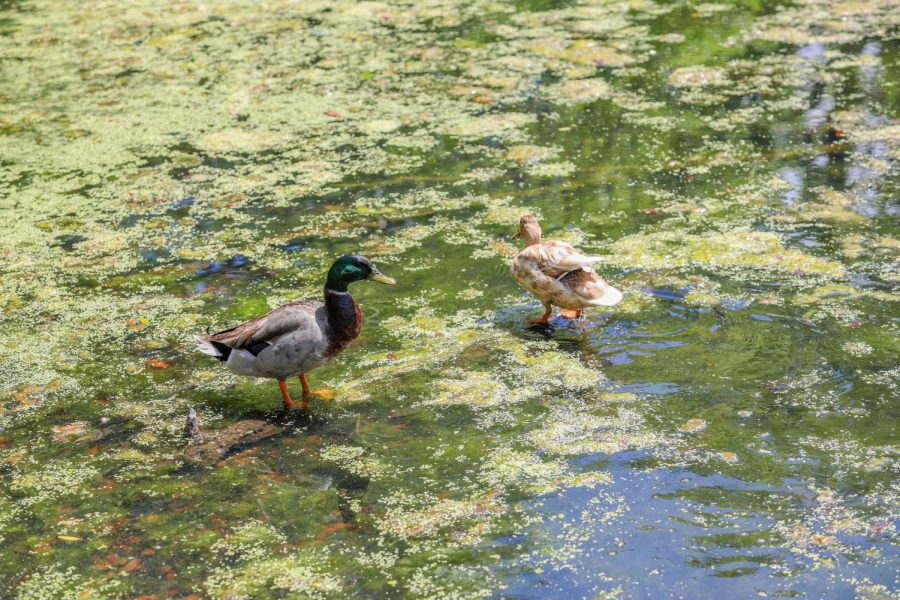Foreign ducks flock to New Orleans due to climate change
Ducks search for food at the Audubon Park pond on April 19, 2022. Local park goers and natural scientists have noticed a rapid increase in the number of ducks in Audubon Park.
April 30, 2022
The rapid increase in the presence of ducks in New Orleans parks has local bird specialists saying, “What the duck?”
Boisterous and noisy, black belly whistling ducks have flocked to the Gulf South, finding a home in local parks and feeding at grain silos. With their bright colors and distinctive whistling call, the birds are a sight to see and hear.
Although the Audubon Society doesn’t keep track of the number of ducks in Audubon Park, park goers and local natural scientists have noticed a drastic increase in birds. In recent years, whistling ducks have flooded Louisiana’s waterways and parks, potentially damaging the area’s fragile ecosystem, according to Robert Thomas, director for Loyola’s Center of Environmental Communication.
“The increase has been very high and very fast,” Thomas said. “They’re coming back with a vengeance.”
The ducks, native to Mexico, relocated from Texas about 15 years ago, WWL reported in 2021. Though the ducks have been around since shortly after Hurricane Katrina, Thomas said he’s noticed a rapid increase in the last few years.
The ducks are most active in New Orleans during the winter and early spring months, as they come during the cold seasons to roost, according to the Audubon Society. They start leaving the area each year in April when the city starts heating up, said David White, professor of biological sciences at Loyola and Mississippi River Delta scientist.
The increase is likely caused by climate change, the Audubon Society said. As temperatures heat up, areas of the United States are becoming hospitable for the ducks. Combined with rich wetlands and mild winters, New Orleans is the ideal habitat, according to White.
Despite the duck population thriving in New Orleans, the birds are facing some risks. In 2020, a migrating group of whistling ducks tested positive for avian cholera, which can be potentially lethal for the birds, according to the Audubon Society. The Audubon duck population was expected to be impacted for three years. This spring, case rates were lower than the previous years, according to Audubon Nature Institute’s Senior Veterinarian Bob MacLean. While avian cholera can have grave consequences for birds, MacLean said the outbreak shouldn’t concern park goers, as humans aren’t susceptible to the avian strain.
“People should not be at all concerned unless they pick up a dead bird, or unless they come in close contact with a dead bird,” White said.
In addition, the United States is currently battling the deadliest outbreak of the avian flu in seven years. While the flu is a low risk for humans, it’s affected nearly 31 million birds since January, devastating bird populations, according to the Center for Disease Control. At this time, the state of Louisiana has not reported any cases of avian flu, though the disease is rapidly spreading, with 33 states affected in four months, according to the CDC.
White said that the cholera isn’t a reason for concern, though the ducks’ effect on the ecology of Audubon’s waterways is. The birds, largely through their waste, contribute to the nutrients of the water, and an excessive number of birds can overwhelm ecosystems and harm other organisms, White said.
“Go over there in mid-August when the water is incredibly warm, and I guarantee you that you’ll see huge algae blooms,” White said.
Thomas Sherry, professor of ecology and evolutionary biology at Tulane and specialist in avian migratory patterns, said that the sheer number of ducks and their waste could cause eutrophication, an excessive amount of nutrients in the water, making it inhospitable for native wildlife.
“There’s thousands and thousands of ducks coming and roosting every day right on the edge of the water, putting a lot of fecal material in the water,” Sherry said. “It would not only spread potential diseases, but also nutrients that will cause changes in the water.”
He also said that the ducks could force out other aquatic birds as they try to compete for resources and adjust to their changing environment, but without comprehensive study on the bird populations, their impact remains unknown.
“It will almost certainly cause dead zones that could kill a lot,” Sherry said. “From what I know about aquatic biology, the impacts could be large, but they’ve probably been going on for a long time.”
Despite concerns about Audubon’s water quality, MacLean said that the park has historically been home to many types of aquatic birds and that the park has not reported any changes to the water quality.










Tony • May 14, 2022 at 7:32 pm
Climate change? Please provide a reference to a peer reviewed study, or any published paper (peer reviewed or not for that matter), to back up this claim. This headline reads climate change, but the article only barely cites this as the cause and it appears as conjecture. Dangerously dilutes the meaning of this very important term.
Charlie Johnson • Apr 30, 2022 at 4:10 pm
Does anyone proof articles prior to publication? The ducks in the photo are a male and female native mallards. The black bellied ducks the article is about blew in with Katrina and have bee been breeding all over Jefferson and Orleans parishes for years.